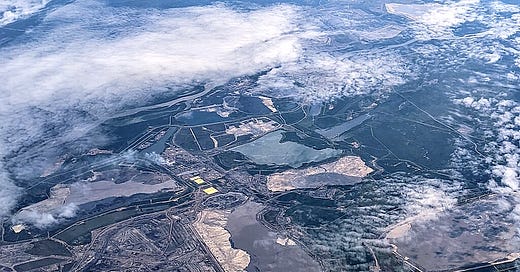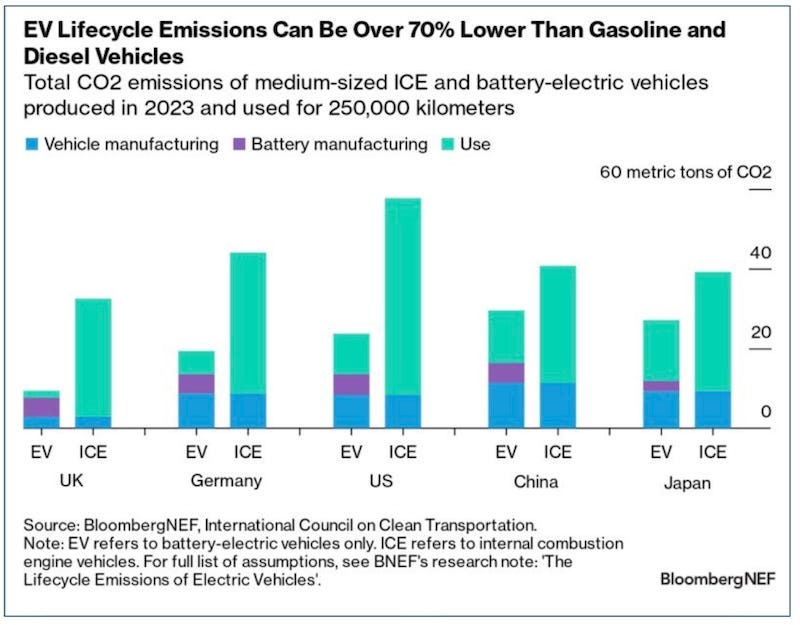Coming Soon: It’s Game Over for Big Oil
The fossil fuel industries are edging toward their terminal decline. But they aren’t going to go easily, and some of the world’s most vulnerable communities are bearing the brunt.
How could it possibly make sense that an industry that extracted more than 100 million barrels per day of oil last year is moving toward its inevitable collapse?
Yet the traditionally cautious, conservative International Energy Agency projected last week that global oil demand will peak this decade. The IEA’s news generated the predictable pushback from the predictable sources. But we also saw at least one veteran analyst declaring that the industry as we know it has as little as five to 10 years left.
Whichever scenario you pick, oil production won’t disappear tomorrow. It might not completely disappear by 2050, the target date for bringing global climate pollution to net-zero.
But if you pay close attention the pace and direction of the energy transition—and contrast it with the over-the-top boosterism we’ve been hearing from fossil fuel executives—you get a picture of an industry at the top of a downward spiral, hoping desperately that the right words and the next lavish lobbying campaign will hold off the inevitable.
When the CEOs of Suncor Energy, Imperial Oil, Cenovus Energy, Shell Canada, and Enbridge Inc. videoconferenced in to a Commons committee meeting earlier this month, the MPs were their immediate audience. But in a very real sense, they were talking over the legislators’ heads to the deep-pocketed investors whose billions they’ll need to continue building out their industry.
Because sooner or later, and let’s hope soon enough, those financiers will finally figure out that the risks in fossil fuels outweigh the short-term profits they’ve been raking in, and that the energy transition really is the best investment opportunity they’ll see in their lifetimes. That’s when we’ll see how fast trillions of dollars can pivot (for better and for worse) to the next big thing, far faster than the custom-made physical assets at a suddenly redundant oil sands mine can be converted into…anything useful, actually.
Hell-Bent to Extract Oil
The IEA paints a measured, formal picture of an industry wracked by uncertainty, on track to produce considerably more oil this decade than anyone will need but still hell-bent in its determination to keep. On. Extracting. Until all else fails.
The IEA sees “myriad challenges” in global oil markets where overall demand is flat and the energy transition is surging. “As the pandemic rebound loses steam, clean energy transitions advance, and the structure of China’s economy shifts, growth in global oil demand is slowing down and set to reach its peak by 2030,” said Executive Director Fatih Birol. He added that the analysis points to “a major supply surplus emerging this decade, suggesting that oil companies may want to make sure their business strategies and plans are prepared for the changes taking place.”
In less polite language:
Dudes, listen up! Your day is done! You might want to keep on investing, exploring, drilling, and extracting, but don’t expect anyone sane to follow you over the cliff!
The IEA’s analysis shows world oil supplies outrunning demand beginning next year, largely because producers in the United States and other parts of the Americas just keep on drilling and pumping. But before much longer, oil production “is forecast to lose momentum and swing into contraction” toward the end of this decade. Already, Saudi Arabia has cut production and scaled back plans for future expansion, and the IEA sees the industry as a whole shifting its gaze to petrochemical feedstocks, now clearly emerging as “the main pillar of global demand growth”.
In other words, with gasoline, diesel, and other fuels accounting for nearly three-quarters of the crude in a barrel of oil, petrochemicals and plastics are quickly emerging as the industry’s last stand.
Our friend Markham Hislop at Energi Media has a more visceral take. “The giant companies that made Canada the fourth largest oil producer and the fifth largest gas producer are likely to be failing or bankrupt within a decade,” he predicted last week, after the Canadian oil execs’ virtual appearance on Parliament Hill. “They have nowhere to pivot and have bought in wholesale to the fantasy that emerging economies will be their salvation. “
But “there is no salvation. They are doomed. Sooner or later, but probably sooner.”
Trying to Sleep at Night
So, really—if you were a bank, pension fund, or institutional investor that wasn’t already firmly ensconced in the fossil industry’s back pocket, why would you want anything to do with new oil and gas infrastructure? What’s in it for you if you know that a project approved in the late 2020s won’t go into production before the early 2030s, and won’t have any hope of recovering costs for several years after that, while climate impacts become ever more obvious and the energy transition keeps gaining momentum?
Even if they aren’t saying it out loud, or saying it in polite company, fossil executives must surely be asking themselves that very question while they’re trying to get to sleep at night.
Right on cue, and just as you would expect, the oil cartel magnates at the Organization of the Petroleum Exporting Countries (OPEC) pushed back on the IEA’s analysis. Secretary General Hathaim Al Ghais branded the IEA’s “unrealistic scenario” a "dangerous commentary, especially for consumers, [that] will only lead to energy volatility on a potentially unprecedented scale."
But this isn’t the first time we’ve seen solid evidence that the fossil fuel era is winding down faster than the industry wants you to think. The IEA declared the “beginning of the end” for oil and gas last September. Veteran China specialist Lauri Myllyvirta, co-founder and lead analyst at the independent Centre for Research on Energy and Clean Air, first reported in November that the country’s emissions were on track to decline this year.
And those projections were just based on today’s climate and energy policies. Imagine if countries were really trying to address climate change and “treating it like a damn emergency”!
A Messy Road From Here to There
The weight of evidence for a declining fossil sector might come just in time to avert the worst impacts of climate change. But those impacts are already unevenly distributed between the rich countries that have gained most from the fossil fuel era and the mostly tropical, developing countries that are already bearing its worst impacts, after accounting for a tiny thimbleful of total global emissions.
Navigating the transition is already looking very messy. Every time the industry mounts another big PR and lobbying effort to slow down the inevitable, or just sets out to rig the marketplace, it gets that much tougher and more confusing to build a pathway from here to there that brings people along, rather than leaving them behind.
Shifting to a whole new economy will be hard enough for the single-industry towns that depend on oil, gas, and coal. But that much tougher with the companies selling them on future prospects like small modular nuclear reactors or carbon capture and storage that aren’t nearly ready for prime time—and won’t be in time to sustain those local economies.
Fixing the toxic mess of the industry’s tailings ponds and abandoned wells, left to accumulate by industry execs who must never have learned in kindergarten to clean up after themselves, will cost billions upon billions of dollars—$260 billion in Alberta alone, according to a private estimate by one senior regulator. And you can bet it’s in the industry’s playbook to leave taxpayers to pick up the tab.
Conditions are that much more dire in developing countries like petrostate Nigeria, where whistleblower and former industry consultant Caroline Dennett says Shell is operating with “zero corporate responsibility”.
“It’s down to regulation and operational standards. Shell do not give a toss about standards in the Niger Delta,” she writes. “For decades, they have actively coerced successive governments to go soft on regulation and legislation that would protect the people and environment in oil-bearing communities. This has led to clearcut cases of ecocide, and arguably cases of genocide, particularly against the Ogoni people.”
A Climate Scientist Sees Hope
Against those monumental challenges, the IEA’s analysis is the latest marker that the energy transition is under way and picking up momentum—still not fast enough, still not far enough, but delivering the measurable results that should give everyone the hope and conditional optimism [pdf] to keep up the fight. (I was glad to see the quote from Václav Havel resurface last week—I’ve literally been carrying it with me everywhere I go for decades.)
That’s why it was so refreshing to see U.S. atmospheric chemist Susan Solomon urge readers not to give up at just the moment when “we’re right on the cusp of success”. She told The Guardian:
The past calendar year has been a surprise—hotter than anyone expected it could or should be. There’s a lot of work going on to try to figure it out. So, yeah, that is certainly scary, but I don’t share the pessimism. And I worry, frankly, about climate scientists being encouraged to take a particular stance. You see it go in both directions, but in this case there has long been a group of people out there who believe we should tell the worst stories we possibly can, because then the public will get it and wake up and that will enable change. That practice has not really worked. Also, you can’t look at the [falling] price of solar energy and batteries and not see big change coming…
Solomon isn’t offering any guarantees, and no one should expect any—not now, and not against any past crisis that humanity has ever confronted. But there’s good reason to believe that we still have the ability to write the last chapters of this story. Not least because the oil and gas industry will soon have less to say about it.
Mitchell Beer traces his background in renewable energy and energy efficiency back to 1977, in climate change to 1997. Now he and the rest of the Energy Mix team scan 1,200 news headlines a week to pull together The Energy Mix, The Energy Mix Weekender, and our weekly feature digests, Cities & Communities and Heat & Power.
Chart of the Week
Scale Back Gas Networks or Face Higher Costs, Stranded Assets, Climate Institute Warns Provinces
Montreal Adds Nine More Car-Free Streets after ‘Mind Blowing’ Success
Water Supplies Approach ‘Day Zero’ as Drought, Heat Dome Hit Mexico City and Bogotà
Ranchers, Rural Municipality Ask Top Court to Block Alberta Coal Exploration
Battery Storage Fire in California Sparks Widespread Safety Concerns
CCS Contracts Threaten to Stall as Developers Demand Better Price Guarantees
Don’t Try This At Home: EV Battery Repairs Are Desirable But Difficult
Centrist Parties Hold Majority, EU Green Deal Intact as Parliament Shifts to the Far Right
Following Conservative attacks, government releases internal data on the impact of carbon pricing (Canadian Broadcasting Corporation)
Haisla members vote overwhelmingly in favour of supporting Cedar LNG (Globe and Mail)
Climate report labels planned $1 trillion LNG infrastructure expansion as ‘one way ticket to stranded assets’ (Offshore Energy)
Ontario plastics plant facing government orders to reduce toxic emissions will shut down permanently (Canadian Broadcasting Corporation)
Follow the U.S. lead on inter-regional bus service (Policy Options)
Local opposition to renewable energy projects ‘widespread and growing’: Columbia University report (Utility Dive)
Solar co-ops help more people get a piece of the sun's energy (Canadian Broadcasting Corporation)
Climate gets a seat in Chicago teachers’ talks (Politico)
Former BP boss calls for end to new North Sea drilling licences (Financial Times)
New Zealand to introduce bill to reverse oil and gas exploration ban (Reuters)
Guinness’ main brewery is replacing fossil fuels with heat pumps (The Progress Playbook)
Climate scientist Susan Solomon: ‘Let’s not give up now – we’re right on the cusp of success’ (The Guardian)








